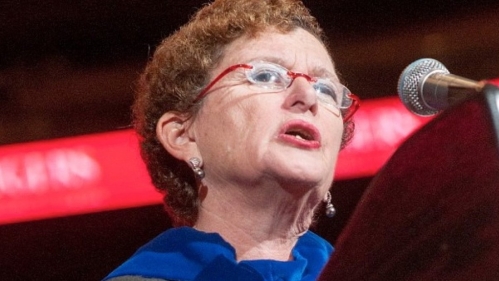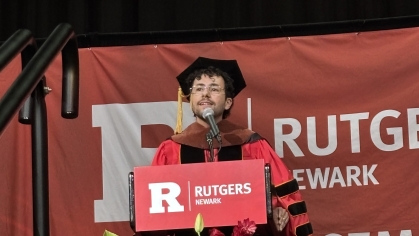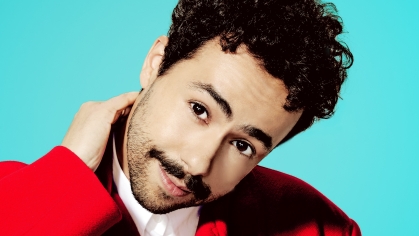Our dear friend and colleague, Professor Clement A. Price says “All Roads Lead to Newark,” and I would add today, that Newark leads to all roads.
-Nancy Cantor
Welcome and congratulations to our terrific Rutgers University-Newark graduates – this is such a triumphant day, for you, for your families, and for all of us – this is a day for smiling and cheering – and let’s join in a big round of applause for this class of 2014 graduates!
Looking out at this magnificent crowd today, I can’t help but think about the power of a phrase our dear friend and colleague, Board of Governors Distinguished Service Professor Clement A. Price, the official historian of Newark, NJ says, and that is: “All Roads Lead to Newark,” and I would add today, that Newark leads to all roads. You have been with the world here and you can take what you have learned down a wide variety of roads (or maybe if we are lucky stay here in this vibrant metropolitan region that so wants your talent and commitment), and that is why today is so full of the optimism of possibility.
As the great educational philosopher, John Dewey, reminded us, education is a fundamentally social experience that depends critically upon the mix of questions asked and ideas shared, and you have spent your time here with such a diverse collection of people sharing so many cultures, heritage languages, life experiences that you know what we mean when we say – all roads lead to Newark, not to forget the remarkable array of formal classes, internships, laboratory experiences, community-engaged learning, research theses, that you undertook– that constituted an immersion in Dewey’s other favorite maxim of “learning by doing,” – you didn’t sit still, not at Rutgers University-Newark, and that will prepare you for going anywhere and doing anything – indeed, your time at Newark will lead you anywhere you want to go.
Now, before you get too emboldened by this heady moment of possibility, I do have one important caution to take heed of and that is that you can’t go it alone – you didn’t take the road to Newark on your own (as your families here will attest); you didn’t learn at Rutgers-Newark on your own (as your faculty, friends, mentors, advisors will attest); and you won’t accomplish what you so dream of doing next on your own (as your soon-to-be co-workers, supervisors, professional mentors, faith leaders, community colleagues, and neighbors, will surely remind you in the days ahead).
This is the wisdom behind the great civil rights hymn “we shall overcome” which intones – “deep in my heart, I do believe, we’ll walk hand in hand, someday.” We all depend upon others, not just to “get by” but to flourish, to create and innovate, to make a difference, to make life matter.
Yet, how can I expect you to remember this power of walking hand in hand on this day, a day devoted in some real sense to independence, to the celebration of your “individual” achievement and accomplishment?
Easy, you might well say – we are the “connected generation,” after all. We live in a “flat world” after all. We know about “networks.” We embrace “distributed learning.” We are comfortable with “border and boundary crossing.” In fact, we’ve done all of this expansive learning and interconnecting at Rutgers-Newark – working in groups; studying abroad; networking in internships; presenting at conferences; learning on-line; communicating through twitter, face-time, Skype…and many other media that I can’t even spell or imagine.
All good, I say back – but if internalizing the fundamentals of interdependence is so easy, why do we live in a world ripe with divisive rhetoric and scarce in civic dialogue, one in which we mythologize heroes and heroines as lone warriors triumphing against all odds, and we tell our children, as the political theorist Danielle Allen notes, not to talk to strangers – an admonition that may be sadly adaptive in our world.
Surely part of the answer to the pervasive under-valuing of interdependence, and its kindred construct of social responsibility, lies in the seemingly contradictory reality that it is at once too easy for us to connect – even though, to paraphrase Vartan Gregorian, President of the Carnegie Corporation, connectivity does not ensure real connection – and yet too hard to imagine making progress on what ails our neighborhoods, schools, environment, politics – and so we let it rest with a bit of virtual reaching out, and turn again to the business of ensuring our individual way forward.
Now don’t get me wrong – you need to work on a way forward – a foot in the door of your profession – and we think that you have prepared well for that journey here at Rutgers-Newark. Some of you have waded into the New Jersey Meadowlands with scientists from our faculty and researchers from regional and federal environmental agencies; some of you discovered the power of the arts to heal by helping victims of violence tell their stories with glass books; some of you immersed yourselves in your future professions through internships in major accounting firms, government agencies from Newark to Trenton to Washington, D.C., or with local, regional, or national nonprofits; and many of you have worked while you’ve gone to school, continuously testing the lessons of the classroom in the crucible of your workplaces. But you need to be mindful of more, as we need more from you, if we are all going to prosper.
And, actually, I am confident that you are mindful of more, because that is what being here, at Rutgers-Newark and in Newark does – there is something authentically engaging about this wonderful place, something that draws us together and brings out our best selves together in common cause, whether close to home or around the world. That is why you hit the local streets in partnership with the Newark Housing Authority to solicit residents’ visions of better neighborhoods; why you worked with our staff, faculty, and fellow students to host an LGBTQ summit for local high school students; why you’ve rolled up your sleeves and gotten dirt under your fingernails to make our campus into an urban oasis for migrating birds; why you’ve worked in Central America, partnering to build more sustainable local economies and healthcare infrastructure; why a globally renowned 75-year old jazz great among you who just earned her second master’s, performs benefit concerts for her local church. That is why you’ve engaged Newark public school students in the art of debate, guiding them along the same path that brought you to national acclaim in college debate circles.
It’s experiences like all of these — on top of the many foundational lessons you’ve learned from family and friends throughout your lives—that have prepared you to dream big, big enough to the change the face of this city, our state, and our world in ways not unlike what that immortal Newarker, jazz legend Sarah Vaughan had in mind when she sang in “Make This City Ours Tonight”:
My imagination is changing the skyline we know
Step into my fantasy and, baby, don't let me go
We must be the best thing the eyes of this town ever seen
Feels like we've started a party and covered the city with dreams
So as you leave here today, we hope you go forth with that kind of confidence, too, because you’ve covered our city in dreams, and together, we’ll keep making them come true.
Congratulations!



